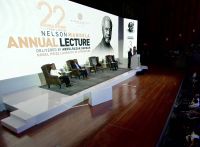
The 22nd Nelson Mandela Annual Lecture was delivered by Nobel Laureate in Literature, Abdulrazak Gurnah. In his address, Gurnah spoke to his experience of our shared humanity and its resilience across time. It is this acknowledgement, that we are not seeking something new, something unheard of, something impossible, but that we are seeking only to remember, reaffirm and dig deep into a practice we have known, that offers us back some measure of power in the face of hopelessness.
This year’s lecture, held on the 28th of September by the Nelson Mandela Foundation at the Wits Linder Auditorium, saw outgoing Chair of the Board, Professor Njabulo Ndebele setting a global scene of multiple, intersecting injustices – the climate crisis, increasing inequality and the normalisation of war and conflict. He referred to the parallel domestic experience of precarity, indignity and lack of safety by acknowledging that for many in our country, “‘home’ is but a semblance of freedom.”
In this context, this year’s annual lecture sought to pursue a theme that is useful in calling out the enduring double standards in our global governance, legal and economic systems, and the selective application of human rights. It does so at a time when South Africa prepares to take over the G20 presidency from Brazil in 2025, focusing on the climate crisis, global south solidarity and the international financial reform needed to drive the many ambitions for the energy transition. In a statement issued at the G20 Foreign Ministers Meeting in 2024, then International Relations Minister, and now incoming Chair of the Board at the Foundation, Dr Naledi Pandor, stated clearly that, to end “institutional impunity,” global governance reform is absolutely necessary - referring to the lack of enforceability within the international system, and the “responsibility to protect” that onlooker states arguably fail to exercise in the face of regional conflict and genocide. In his September G20 troika high level address, underscoring the South African Presidency’s priorities, Minister Ronald Lamola states that “the world should finance more development than wars.”
Incoming Chief Executive of the Foundation, Dr Mbongiseni Buthelezi, also spoke about solidarity but with a grounding reminder that ‘solidarity’ is not unique to only decolonial movements, but that solidarity is already well in the employ of destructive political forces. For example, the US congress has demonstrated incredible solidarity - ostensibly with genocide, having provided more finance for military use to Israel alone over the last year (more than 12.5 billion USD), than they have committed to international climate finance in 2024 (9.5 billion USD). In the face of these deeply impactful figures, what are words, and how can they give breath to an active solidarity with those who value and respect human life and dignity?
Gurnah emphasised the need to move beyond the slap on the wrist of condemnation and rhetoric, to actively building and hosting generative spaces for resistance. He shared from his own recollections of the Tanganyikan boycotts of Apartheid South Africa’s products in the 1960s, and the importance of cultural work and writing in opening a world of shared, decolonial, African understanding. In his address, Gurnah emphasised that solidarity rises first from communities and ‘ordinary people’. As much as state-led interventions and reforms may be needed, Gurnah proposes that we should also question the devolution of our power to the state. In his description of how he has seen and been part of decolonial solidarity efforts through his writing and beyond, Gurnah implies that it is only a reclamation of this shared understanding, some sense of intersectional solidarity beyond the state-sanction, that can transcend the deliberate obfuscation of who deserves to be regarded and treated as worthy of humanity.